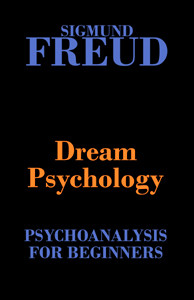
Dream Psychology by Sigmund Freud was a revolutionary work at its time. First of all, Freud pointed out the connection between some part of every dream and some detail of the dreamer’s life during the previous waking state. This positively establishes a relation between sleeping states and waking states and disposes of the widely prevalent view that dreams are purely nonsensical phenomena coming from nowhere and leading nowhere.
Dreams are symbolical
Secondly, Freud, after studying the dreamer’s life and modes of thought, after noting down all his mannerisms and the apparently insignificant details of his conduct which reveal his secret thoughts, came to the conclusion that there was in every dream the attempted or successful gratification of some wish, conscious or unconscious. Thirdly, he proved that many of our dream visions are symbolical, which causes us to consider them as absurd and unintelligible; the universality of those symbols, however, makes them very transparent to the trained observer.
The connection between dreams and insanity
Fourthly, Freud showed that sexual desires play an enormous part in our unconscious, a part which puritanical hypocrisy has always tried to minimize, if not to ignore entirely. Finally, Freud established a direct connection between dreams and insanity, between the symbolic visions of our sleep and the symbolic actions of the mentally deranged. Download the free PDF Ebook here:
 Dream Psychology Sigmund Freud(Psychoanalysis for Beginners)
Dream Psychology Sigmund Freud(Psychoanalysis for Beginners)
Unraveling the Depths of the Unconscious: Sigmund Freud’s “Dream Psychology”
Introduction: Sigmund Freud, the renowned Austrian neurologist and founder of psychoanalysis, revolutionized the understanding of the human mind. Among his numerous groundbreaking works, “Dream Psychology” stands as a cornerstone of his contributions. Published in 1899, this captivating book delves into the enigmatic realm of dreams, exploring their hidden meanings and shedding light on the mysteries of the unconscious mind.
The Unconscious Mind
Freud postulated that the unconscious mind is the repository of our deepest desires, fears, and unresolved conflicts. Within this hidden realm, he believed that dreams served as the “royal road” to unlocking unconscious desires and allowing their expression in symbolic and disguised forms.
Interpreting Dreams
“Dream Psychology” outlines Freud’s theory of dream interpretation, which he termed “the royal road to the unconscious.” According to Freud, dreams possess latent and manifest content, wherein the latent content represents the underlying meaning of the dream, while the manifest content is the dream’s storyline or surface-level narrative.
Symbolism and Displacement
Freud asserted that dreams rely heavily on symbolism and displacement. Symbolism occurs when a dream object or situation represents an underlying, often repressed, desire or emotion. Displacement, on the other hand, involves the transfer of emotions or desires from their true source to a more acceptable or safe object or situation within the dream.
The Role of Wish Fulfillment
Central to Freud’s theory is the concept of wish fulfillment, wherein dreams allow the unconscious mind to satisfy forbidden or unfulfilled desires that are suppressed in waking life. Dreams provide an outlet for the expression of these desires in a symbolic, metaphorical, or distorted manner.
Repression and the Unconscious Conflict
Freud believed that dreams offered a window into the conflicts that exist within the unconscious mind. Often, these conflicts arise from repressed thoughts, memories, or emotions. Dreams, through their symbolic nature, provide a means for these repressed elements to surface, allowing individuals to confront and potentially resolve their internal struggles.
Sexuality and Dreams
Freud’s exploration of dreams inevitably led him to explore the intricate relationship between dreams and human sexuality. He argued that sexual desires and fantasies, often suppressed by societal norms, find expression in dreams, presenting an opportunity for the unconscious mind to fulfill these forbidden longings.
Criticism and Legacy
While Freud’s theories have had a profound impact on psychology and popular culture, they have also faced criticism over the years. Some skeptics argue that the interpretations of dreams can be highly subjective and lack scientific rigor. Nevertheless, Freud’s ideas continue to shape contemporary theories of dream analysis and provide valuable insights into the workings of the human mind.
Conclusion: Sigmund Freud’s “Dream Psychology” remains a landmark work in the field of psychology, illuminating the mysterious world of dreams and unveiling the depths of the unconscious mind. By exploring the symbolism, wish fulfillment, and conflicts within dreams, Freud offered a unique perspective on the human psyche, leaving an indelible mark on the study of dreams and their interpretation. Despite ongoing debates and criticisms, Freud’s legacy endures as a testament to his profound influence on our understanding of the mind and its hidden intricacies.
You can buy the print version here: Link


epub Dropbox link says file has been deleted.
Thanks, fixed
Admin
Awesome work…